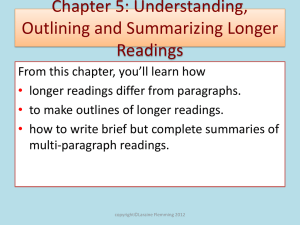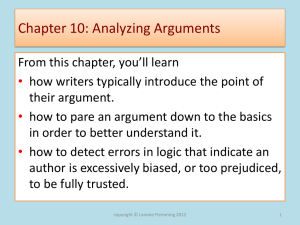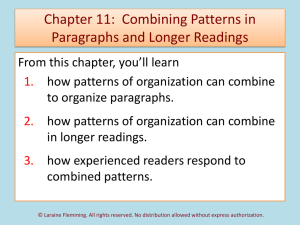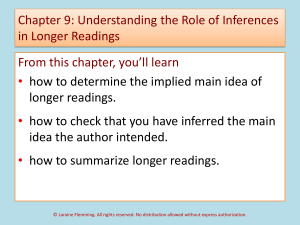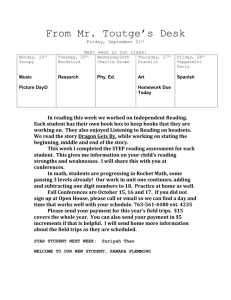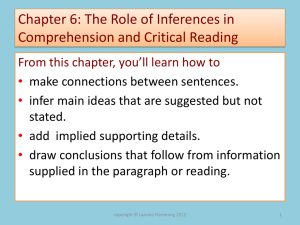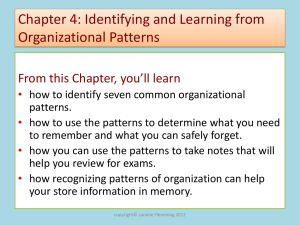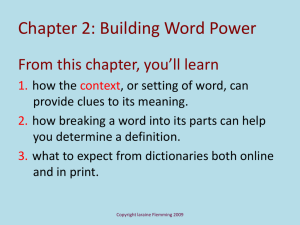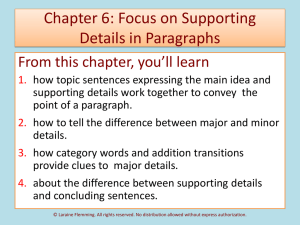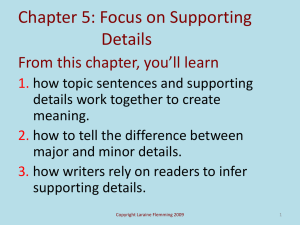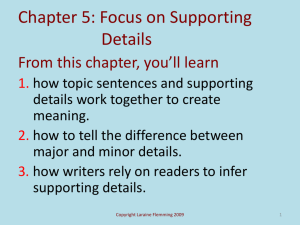Chapter 8: Understanding the Difference Between Fact and Opinion
advertisement
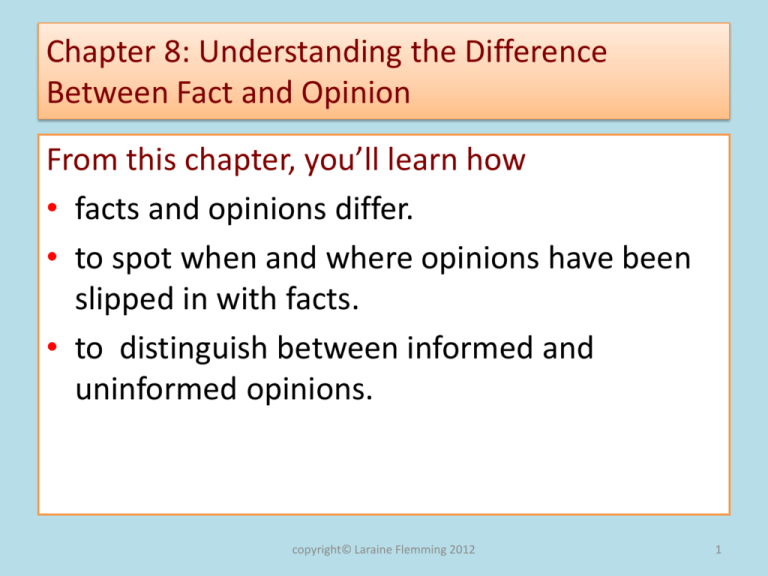
Chapter 8: Understanding the Difference Between Fact and Opinion From this chapter, you’ll learn how • facts and opinions differ. • to spot when and where opinions have been slipped in with facts. • to distinguish between informed and uninformed opinions. copyright© Laraine Flemming 2012 1 Defining Terms: Factual Statements Statements of fact • can be verified, or checked, for accuracy. • often include dates, numbers, and statistics. • do not vary from person to person or place to place. • describe events in language that has little or no emotional effect on the listener or reader. • don’t make predictions, express value judgments, or offer interpretations. • aren’t subject to change, except in cases where previously unavailable information or new technology arrives on the scene. copyright© Laraine Flemming 2012 2 The following are all statements of fact 1. Rapper Eminem said in an interview on 60 minutes that he only uses profanity in his music, never at home. 2. In 1950, the leader of South Korea, Syngman Rhee threatened to invade North Korea. 3. The Australian Julian Assange is the founder of WikiLeaks. 4. Singer and songwriter Alicia Keyes is a classically trained pianist. copyright© Laraine Flemming 2012 3 Defining Terms: Opinions Statements of Opinion • are influenced by the writer’s or speaker’s experiences, training, interests, and context. • use language that often packs an emotional punch. • frequently make value judgments, e.g., “Rachel Ray is much more likable than Martha Stewart.” • often predict future events. • are likely to provide interpretations of events, e.g., “ In his brutal treatment of Rihanna, Chris Brown was repeating what he had learned from his father.” • cannot be checked for accuracy. copyright© Laraine Flemming 2012 4 Spot Quiz on Fact and Opinion What makes statement 1 a fact and statement 2 an opinion? 1. In 2010, three teenage boys from the Fiji Islands were adrift on the ocean for fifty days. 2. God was watching out for the three teenage boys who were rescued in 2010, after being adrift on the ocean, with no food or water supplies, for a total of fifty days. copyright© Laraine Flemming 2012 5 What makes both of these statements facts rather than opinions? 1. The blues singer Etta James was born Jamesetta Hawkins on January 25th, 1938. 2. Beyoncé Knowles played the blues singer Etta James in the film Cadillac Records. • How might you re-write each of these statements to make them opinions rather than facts? copyright© Laraine Flemming 2012 6 Here are two possible ways those facts could become opinions. • Jamesetta Hawkins born January 25, 1938 went on to become Etta James, the greatest blues singer of all time. • When Beyoncé Knowles played Etta James in Cadillac Records, she proved, once and for all, that she could act as well as sing. copyright© Laraine Flemming 2012 7 Blending Fact and Opinion Writers don’t necessarily keep facts and opinions in separate sentences. Often the two are blended together. Where in the following sentence does the fact leave off and the opinion begin? • Grizzly bear deaths neared record levels for the region around Yellowstone National Park in 2010, but government biologists said the population is robust enough to withstand the heavy losses. What word would need to be changed to make the opinion part of the statement a little more obvious? copyright© Laraine Flemming 2012 8 Sometimes one word makes all the difference. Note how the change of one word makes it clearer when an opinion is being inserted: Grizzly bear deaths neared record levels for the region around Yellowstone National Park in 2010, but government biologists believe the population is robust enough to withstand the heavy losses. copyright© Laraine Flemming 2012 9 Be alert to words that make value judgments; they are signs of opinions being mixed in with facts. Where in the following statements are words that evaluate the person or action described? 1. Surprisingly, only five per cent of the students attending charter schools performed better than students attending public schools. 2. Understandably, the park service employees had to shoot grizzlies that had approached human beings. 3. Out of necessity, the university launched a new program focused on preventing plagiarism. copyright© Laraine Flemming 2012 10 Spot Quiz: Recognizing Facts, Opinions, and a Mix of Both Identify each of the following statements as a fact, an opinion, or a blend of both: 1. In August 2006, the International Astronomical Union voted to demote Pluto from a full-fledged planet to a “dwarf planet.” 2. Inside Job, a movie about the financial meltdown of 2008, is a documentary that should be seen by everyone interested in knowing how such a disaster could happen. 3. No one under the age of thirty uses e-mail anymore; it’s too slow. 4. In 2010, the eruption of Iceland’s Eyjafjallajokull volcano spewed clouds of ash into the sky as high as 33,000 feet. 5. In 2010, Joao Silva, one of the most talented and respected photojournalists working in the world today, lost both of his legs when he stepped on a plastic land mine in Afghanistan. copyright© Laraine Flemming 2012 11 Informed and Uninformed Opinions • You can’t verify an opinion. If someone says, Apple’s iPhone is a better cell phone than Google’s Android, you can’t disprove that person’s opinion because what you think of as better- say the ability to add apps from developers not approved by Apple—might not be be shared by the iPhone lover, who favors high tech, good-looking design and ease of use. • In other words, it’s very hard, sometimes impossible, to verify why one thing is better than another because the criteria, or standards, for that judgment vary from person to person. There’s no outside source to check for accuracy. • However, you can decide, or even say, aloud that the other person’s opinion is informed or uninformed. Here’s the difference between the two: copyright© Laraine Flemming 2012 12 Defining Terms: Informed and Uninformed Opinions Informed opinions are • backed by reasons. • supported by facts. • based on up-to-date evidence. Uninformed opinions lack all of the above. In addition, they are • often expressed with great confidence. • frequently voiced in a way that discourages the expression of opposition. copyright© Laraine Flemming 2012 13 Example of an Informed Opinion Informed • If you think you have to become muddled and soft-headed as you age, think again. As we grow older, the two sides of the brain become more connected, allowing us to recognize patterns more easily and draw more original conclusions about the world around us. To get some insight into how the brain’s hemispheres become more cooperative over time, Gene Cohen’s book The Mature Mind is a superb resource. As Cohen writes, “The neurons themselves may lose some processing speed with age, but they become ever more richly entwined… making way for greater creativity.” copyright© Laraine Flemming 2012 14 Example of an Uninformed Opinion • Since the 1980s, the United States has rapidly been taken over by the wealthiest one percent of the population. The rich have gotten richer, and the poor have gotten poorer. In many ways, we have seen the hands of time turn backward, and the country today resembles the Gilded Age of the late nineteenth century when the country was ruled by the wealthy industrialists who emerged following the Civil War. Note: The opinion expressed here has no back up. It’s not informed by any reasons or evidence for the claim. The reference to the Gilded Age of the past starts to provide a reason for the opinion, but lacking any details about the resemblance, the allusion adds nothing to the author’s original statement. copyright© Laraine Flemming 2012 15 Final Wrap 1. What’s the key difference between facts and opinions? 2. Is the following statement a fact or an opinion: “Without doubt, feminism has made women unhappier now than they were before the second wave of feminism began in the 1960s”? 3. Fact or Opinion? In the United States, bullying in the schools has become an epidemic at all grade levels. 4. Fact or Opinion? Thomas Jefferson issued repeated warnings against the dangers of a centralized government. 5. Fact or Opinion? In 2009, the World Health Organization issued a statement saying that swine influenza had become a pandemic, meaning the virus could be quickly spread throughout the world. copyright© Laraine Flemming 2012 16 Final Wrap 6. Are the following statements fact, opinion, or a blend of both? a) In 47 B.C. Cleopatra took a trip down the Nile with Julius Ceasar. b) Jay-Z, born Shawn Corey Carter in 1969, exemplifies the American belief that people can make their own success with a mix of luck and hard work. c) When Louis Brandeis was nominated to the Supreme Court in 1916, his nomination was attacked, and Brandeis was called a troublemaker, a hypocrite, and a socialist, but what his critics really meant was that Brandeis was Jewish. copyright© Laraine Flemming 2012 17 Final Wrap 7. Is the following opinion informed or uninformed? • Grizzly bear deaths in the region around Yellowstone National Park rose to record levels in 2010. According to government biologists, we should not be concerned that this endangered group of animals took such a hard hit. But I, along with other wildlife groups like the Greater Yellowstone Coalition, have my doubts. Two dietary staples of grizzlies are declining, the cutthroat trout and nuts from whitebark pine cones. The more their food supplies decline, the more likely it is the bears will push into humaninhabited areas, where they are likely to be killed. In addition, the human population in the area surrounding Yellowstone is growing, making it more likely for bears and humans to collide, a meeting that is likely to end with some bears dying. As Chuck Schwartz, a U.S. biologist has pointed out “Eight-five plus percent of independent bears that die, die because of people.” In other words, the more bears come into contact with people, the more likely they are to die. Given that fact, the government’s optimism for the grizzlies future is hard to fathom. copyright© Laraine Flemming 2012 18 Final Wrap 8. What about this one? • Many of us hope to see the economy return to normal and the jobless rate to be cut in half, but that hope is much too optimistic. What we are experiencing is structural, rather than cyclical, unemployment i.e. the economy no longer needs specific jobs requiring a particular set of skills. For example, now that print can be set via computers, jobs for manual type setters, people who actually moved letters around to create printed pages, no longer exist. This kind of structural unemployment cannot be fixed. Government intervention is useless. The jobs are obsolete and won’t come back. Instead the people who have lost their jobs have to learn new and marketable skills, because the expertise that got them hired in the past won’t get them hired in the future. It is this kind of structural unemployment that we are currently facing. copyright© Laraine Flemming 2012 19 What Do You Think? The government is appealing a ruling that put grizzly bears back on the list of endangered species after they had been removed. The bears were returned to the list due to a law suit filed by the Greater Yellowstone Coalition, an organization that believes the bears should not be “delisted.” The organization filed the suit because it believes that the bears’ being on the list offers them a greater number of protections, which will encourage their survival. Create a search term for a Web search that will give you some insight into the controversy and be prepared to offer, in class or on paper, an informed opinion in response to this question: Should grizzly bears be removed from the list of endangered species? copyright© Laraine Flemming 2012 20
